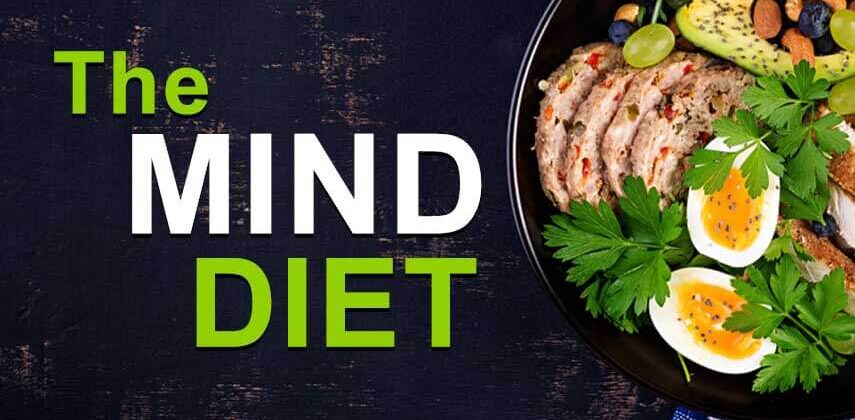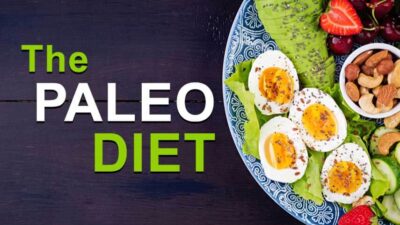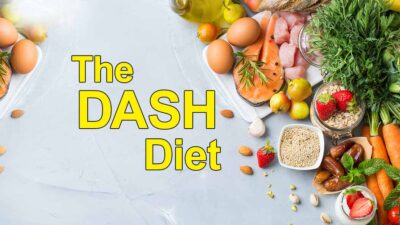The Diet Insiders Score 4.5/5
#6 in Best Diets Overall – Expert Reviews
This article reviews whether the MIND Diet can boost brain health and decrease your risk of memory loss.
What is the MIND Diet?
The “MIND” diet stands for: Mediterranean-DASH Diet Intervention for Neurodegenerative Delay. The MIND diet is an evidence-based diet regimen that aims to prevent cognitive decline and dementia through healthy eating.
The MIND Diet is a combination between two renowned, well-researched diets: the Mediterranean Diet and the DASH (Dietary Approaches to Stop Hypertension) diet. Its’ purpose is to delay cognitive decline and prevent dementia.
- Overall Score: 4.5
- Short-Term Weight Loss: 4
- Long-term Weight Loss: 4
- Easy to Follow: 4
- Healthy & Nutrition Quality: 5
THE BOTTOM LINE: The MIND Diet is a research-backed diet that can help prevent cognitive decline and reduce the risk of developing Alzheimer’s disease. It promotes a high intake of nutrient-dense, brain-protective foods while reducing unhealthy, brain-harming foods, making it a healthy diet for anyone looking to improve health and prevent cognitive decline.
Research on the MIND Diet and Brain Health
The MIND Diet was created by researchers at Harvard University and Rush University Medical Center. A hybrid of the Mediterranean and DASH diets, the MIND diet was modified by researchers based upon studies examining cognitive health.
There are two, multi-year studies published in Alzheimer’s and Dementia in 2015. One study exemplified how following the diet can reduce the risk of developing Alzheimer’s disease by up to 53 percent – greater adherence to the MIND Diet yielded more brain-protective benefits.
The other study revealed how following the MIND Diet delays age-related cognitive decline, keeping the brain up to seven and a half years younger!
The Basics of the MIND Diet
The MIND Diet revolves around the incorporation of 10 evidence-based brain-protective foods and the reduction of 5 brain-harming foods.
The MIND Diet incorporates many of the nutrient-rich plant-based foods that are recommended in both the Mediterranean and DASH Diet, such as whole grains, vegetables, and nuts.
Berries, in all forms, are the only specific fruit recommendation, as they are super-food sources of antioxidants. The brain-harming foods are high in saturated fat, trans fat, and refined sugars, which are all associated with chronic disease.
10 Brain-Healthy Foods to consume on the MIND Diet
- Whole Grains
- Vegetables
- Green Leafy Vegetables
- Nuts
- Beans
- Berries
- Poultry
- Fish
- Olive Oil
- Wine
5 Brain-Harming Foods to reduce or eliminate on the MIND Diet
- Butter and Stick Margarine
- Whole-Fat Cheese
- Fried Fast Foods
- Red Meat
- Pastries and Sweets
How does MIND Diet work?
The MIND Diet works by incorporating the recommended amount of each brain-protective food int the diet. The serving size recommendations are based upon the findings completed by MIND Diet researchers.
The specific recommendations for each brain-protective food are listed below.
On the other hand, the MIND Diet recommends significantly reducing or avoiding the studied brain-harming foods, such as red meat and fried fast food, in order to provide the brain with maximum protection against cognitive decline and Alzheimer’s prevention.
Additionally, the MIND recommends including certain nutrients in the diet to promote brain protection. These nutrients include Vitamin E (food-based sources only), Vitamin B12 and Folate, and phytonutrients known as Carotenoids and Flavonoids.
Foods to Eat on the MIND Diet
As mentioned, the MIND Diet recommends consuming 10 specific foods in order to protect against cognitive decline and dementia.
These foods, which are heart-healthy and disease-protective in and of themselves, are also high in vitamins, minerals, and antioxidants.
The MIND Diet recommends consuming the following 10 foods as part of the brain-protective lifestyle:
- Whole Grains
- Vegetables
- Green Leafy Vegetables
- Nuts
- Beans
- Berries
- Poultry
- Fish
- Olive Oil
- Wine
The MIND Diet also recommends incorporating carotenoid- and flavonoid-rich foods into the diet, as well as food sources of Vitamin E.
Which foods are high in Vitamin E?
- Olive Oil
- Almonds
- Pistachios
- Peanuts
- Sunflower Seeds
- Spinach
- Broccoli
What foods are high in Folate?
- Dark leafy green vegetables
- Legumes such as chickpeas, lentils, beans, and peas
Which foods are high in the recommended Carotenoids?
In order to load up on the recommended brain-protecting Carotenoids, it is recommended to consume:
- Leafy Greens (kale, collard greens, and spinach)
- Carrots, Bell Peppers, Broccoli, Pumpkin
- Pistachios
- Apricots, Cantaloupe, Watermelon, Oranges
Which foods are high in the recommended Flavonoids?
- Deeply pigmented berries such as blueberries, strawberries, raspberries
- Purple vegetables such as cabbage and eggplant
- Quinoa
- Chickpeas or Garbanzo Beans
- Tea such as Green, Oolong, and Black tea
- Oranges, Grapefruit, Lemons, Tomatoes and Parsley
Foods to Avoid on the MIND Diet
The MIND diet lists 5 research-backed foods to reduce in order to promote cognitive protection. The overarching premise behind the avoidance of these foods is limiting foods saturated fats and trans-fat – especially in proportion to healthy unsaturated fats.
The MIND researchers also determined that saturated fats should be replaced with unsaturated fats (such as olive oil and nuts), as to reduce the risk of cognitive decline (not to mention heart disease):
- Red Meat
- Butter and Stick Margarine
- Cheese
- Pastries and Sweets
- Fried Fast Foods
Although these foods are indicated as “brain-harming foods,” they are allowed in small portions on the diet – making it easier for individuals to effectively follow the regimen.
Guidelines for the MIND Diet
The MIND Diet guidelines to protect against cognitive decline and Alzheimer’s Disease are straight-forward. The goal is to include the brain-health foods in the recommended portion and frequency while limiting the brain-harming foods or at least using them sparingly in the amounts recommended.
The MIND Diet offers a “score” of 15, which indicates how well an individual is adhering to the protective MIND Diet. If an individual meets each of the following 15 points, then a MIND diet score of 15 is allotted.
Brain-Protective Food Guidelines
- Brain-Protective Food Guidelines
- Whole Grains: 3 servings daily
- Vegetables: 1 serving daily
- Wine: 1 five-ounce serving daily (not advised to start drinking alcohol if one does not do so now)
- Leafy Greens: 6 servings per week
- Nuts: At least 5 times per week
- Beans: 3 times per week
- Berries: Twice per week
- Fish: Once per week
- Poultry: Twice per week
- Olive Oil: Use as the main oil in diet
Brain-Harming Foods Guidelines
Limiting these as much as possible is clearly the best idea for brain and overall health. At the very least, in order to adhere to the cognitive-protective MIND diet one should consume:
- Butter and Margarine: Less than 1 tablespoon per day
- Pastries and Sweets: Less than 5 times per week
- Red Meat: Fewer than 4 times per week
- Whole-Fat Cheese: Less than one serving
- Fried Foods: Less than once per week
Can MIND Diet help you lose weight?
Although the MIND Diet was not created for weight loss, it promotes the inclusion of nutrient-dense, high-fiber and low-energy foods while eliminating high-saturated-fat and nutritionally void foods with the idea that incorporating these foods into the diet will crowd out unhealthy foods – foods that that can lead to weight gain.
Thus, the MIND Diet may promote weight management as a result. Any diet that emphasizes whole, healthy fiber-rich foods paired with energy balance promotes weight management, as discussed in our previous article on Optimal 5&1 Plan review(which is an another weight loss program).
Additionally, many of the plant-based brain-protective foods in the Mind Diet may also help prevent a myriad of other chronic diseases such as heart disease and cancer.
How easy is the MIND Diet to follow?
The ease of use depends on the individual’s current eating habits and preferences. For those who eat meat regularly, they might even find it easy to follow, as the diet allows for four servings per week of red meat.
Additionally, the MIND diet book comes with extensive lists of each type of food (for example, vegetable lists by season) for ease of use.
The Risks and Benefits of the MIND Diet You Should Know
The benefits of the MIND diet are significant, as the recommended foods are found on nearly every health eating regimen.
The foods recommended such as leafy greens, berries, nuts, whole grains, and beans are associated with reduced risk of heart disease and cancer, to name a few.
Risks associated with any new diet are based upon an individuals’ current medical status. Thus, talk to your doctor before embarking on the MIND Diet to ensure there are no interactions with the recommended foods and current medical status.
For example, the diet calls for leafy greens eaten regularly which can affect those on blood-thinning medications.
Otherwise, the diet simply calls to incorporate extremely nutrient-dense foods into a disease-preventing lifestyle.
Lastly given the health risks associated with alcohol intake, it is not recommended to begin drinking wine if you do not already consume one glass per day.
A Sample 3-Day Meal Plan for the MIND Diet
The MIND diet comes with numerous recipes for each meal. It also comes with a “MIND Food Worksheet Sample” that allots individuals the ability to create their own Mind Diet meal plan based on the recommended servings per week.
It also comes with a “MIND Menu Worksheet Sample” that provide a weekly list of meal and snack examples with recipes provided in the book.
The following meal plan is an excerpt from the MIND Diet plan:
Day 1:
- Breakfast Blueberry-Coconut Overnight Oats
- AM Snack: High-Protein Banana Chocolate Chip Breakfast Cookies
- Lunch: Red Quinoa and Navy Bean Salad with Toasted Almonds, Cilantro, and Lime Cumin Vinaigrette
- PM Snack: Strawberry and Baby Arugula Salad
- Dinner: Roasted Chicken with Fennel, Carrots, and Dried Plums, Oat Cranberry Pilaf with Pistachios, 5 ounces wine
Day 2:
- Breakfast: Creamy Berry Smoothie
- AM Snack: ½ ounce pistachios
- Lunch: Grab-and-Go Pita Slaw Sandwich, Fattoush Salad
- PM Snack: ½ ounce pistachios
- Dinner: Pistachio Crusted Trout, Pomegranate Avocado Quinoa Grain Salad, 5 ounces wine
Day 3:
- Breakfast: Green Smoothie
- AM Snack: 1-ounce Almonds
- Lunch: Quick Chicken-Tortilla Soup
- PM Snack: ½ cup Oatmeal
- Dinner: Tango Fish Tacos, Fiesta Quinoa, 5 Ounces Wine
Take it up a Notch: 5 Additional Tips for Cognitive Health
Following the healthy diet recommendations provided in the MIND Diet can provide your brain with protection against cognitive decline and Alzheimer’s disease.
Here are five additional lifestyle tips to provide the aging brain with additional protection!
1. Walk briskly for at least 40 minutes every other day
2. Engage in positive social interactions as much as possible
3. Practice Meditation
4. Learn something new, such as playing an instrument
5. Avoid aluminum-containing products and cookware
The Bottom Line
The MIND Diet is an evidence-based regimen that serves to prevent Alzheimer’s disease and delay cognitive decline.
Its’ focus on incorporating anti-inflammatory and antioxidant-rich foods such as leafy greens, vegetables, berries, and nuts makes it a sound diet plan for anyone looking to stave off dementia while consuming a nutrient-rich diet overall.







 This article changed my life!
This article changed my life! This article was informative.
This article was informative. I have a medical question.
I have a medical question.
 This article contains incorrect information.
This article contains incorrect information. This article doesn’t have the information I’m looking for.
This article doesn’t have the information I’m looking for.